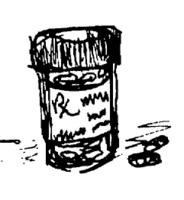The new drug ads.

They don't talk about drugs at all--they describe diseases and symptoms. The latest I've seen is about depression. The TV commercials are from Eli Lilly & Company, and the drug being promoted is Lilly's Cymbalta. The campaign is called "Depression Hurts," and it has its own Web site. Cymbalta is FDA-approved for treatment of both depression and diabetic hand and foot pain.
The new approach sells a diagnosis for which the sponsor has developed a drug. So, no pesky recitation of drug side effects is necessary, because no claims are made in the TV ad for the drug. You may not even notice a drug is involved. You barely have a shot at catching that you've just seen a Lilly commercial.
"Depression Hurts" suggests that there is actual physical pain involved in depression--and the Web site provides a slick animated interactive feature that you can use to "map" your symptoms, complete with coaching--"Did you know? Eighty percent of people with depression complain of sleep problems." When you're done mapping on the site, you can print out your report and take it to your doctor.
These new spots also mention a hormone that other antidepressants haven't mentioned before -- norepinephrine--a fight-or-flight hormone produced by the body in emergencies. I'll have to study some more to see why Lilly thinks this makes Cymbalta essential and better than Prozac (also a Lilly drug--by the way, the Prozac site leads you to news of Cymbalta, touting Lilly's work on "new treatments for depression"--like "depression with pain.") or Zoloft or the others. But the suggestion is that your antidepressant had better not just cover you for serotonin, but norepinephrine as well.
So, Lilly has a double-threat product here, and they're establishing a next-generation diagnosis for it--depression-with-pain.
I just want to remind you that these educational diagnosis campaigns are still drug commercials and multimedia systems for getting you diagnosed for something the drug addresses. Just because you have trouble sleeping or get stomach aches doesn't mean you have depression. I'm not aware of a lot of medical research into depression-with-pain, are you?
In fairness I should say, slick advertising and selling techniques are legal.
We should be able to trust our doctors to sort symptoms out, but something about this diagnosis-marketing technique must be working, or these big, smart pharmaceutical companies wouldn't be spending their profits on it.




2 comments:
i found this ad very interesting, myself. but then, i knew what it was for.
as someone who has suffered from depression for most of my life (as a child, too), i self-medicated (drugs, alcohol) for years, until i realized that these measures were only making it worse.
i took paxil for a long time, until my doctor told me that we could "kill two birds", as it were, with a new drug called cymbalta. you see, i also have chronic back pain, made even worse several months back, by a herniated disc. i switched to cymbalta with an easy transition, and for the first time in my adult life, i feel like a "normal" person.
this kind of advertising is not new. drug companies have for YEARS been advertising the symptoms rather than the "cure". this really allows the people who recognize their problems to find possible treatments, rather than saying, "here's a drug. this is what it's for, and these are all the bad things it might do to you. good luck."
don't knock it, it might help people.
oh, and...
did you never think that being in constant pain could *cause* depression??
just as not everyone who is depressed has pain, not everyone who has pain is depressed. but if you have both, wouldn't you want: 1) to know that you're not the only one; and 2) that there is something out there that could help you??
that's why these are PRESCRIPTION drugs; that's why you need a DOCTOR to get them. one can't just go to the drug store and say, "hey, why don't you give me some of that cymbalta stuff i've been hearing about."
sure, the drug companies are trying to get the word out on their products. but as long as they can help people like me, i'm not too worried about it.
Post a Comment